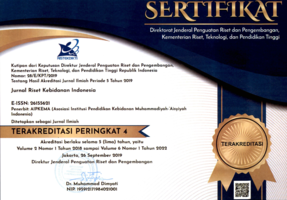Title:
Efektivitas kombinasi birth massage dan perubahan posisi terhadap penurunan nyeri persalinan kala I fase aktif
Author:
Abstract
Latar belakang: Nyeri persalinan merupakan proses fisiologis akibat kontraksi miometrium dengan intesitas yang berbeda pada masing-masing individu. Meskipun fisiologis namun nyeri persalinan akan terasa menyakitkan, tidak menyenangkan dan menakutkan bagi ibu. Tujuan penelitian: Mengetahui efektivitas kombinasi birth massage dan perubahan posisi terhadap penurunan nyeri persalinan kala I fase aktif. Metode: Desain penelitian Quasi Eksperimental Design dengan metode Nonequivalent Control Group Design menggunakan pretest – posttest design. Populasi ibu bersalin kala I fase aktif yang memenuhi kriteria inklusi menggunakan consecutive sampling. Jumlah sampel 48 ibu bersalin yang dibagi dua kelompok yaitu kelompok perlakuan (birth massage dan perubahan posisi) dan kelompok kontrol (birth massage). Pengamatan nyeri persalinan pre dan posttest menggunakan skala nyeri dengan observasi perilaku (FLACC behavioral scale). Hasil: Hasil penelitian menunjukkan rerata skor nyeri persalinan kelompok perlakuan pretest adalah 6,17± 1,129 dan posttest 2,79 ± 1,414 dengan rerata penurunan skor nyeri pretest dan posttest sebesar 3,38 ± 1,173. Sedangkan rerata skor nyeri persalinan kelompok kontrol pretest adalah 6,17± 1,129 dan posttest 2,79 ± 1,414 dengan rerata penurunan skor nyeri pretest dan posttest sebesar 3,38 ± 1,173. Hasil uji Mann – Whitney didapatkan nilai P = 0,564 yang berarti tidak ada perbedaan penurunan nyeri pada kelompok yang diberikan birth massage kombinasi perubahan posisi atau pada kelompok yang hanya diberikan birth massage. Simpulan: Tidak ada perbedaan penurunan nyeri persalinan pada kelompok perlakuan dan kelompok kontrol.
Background: Labour pain is the physiological processes as a result of the contraction of myometrium with different intensity on each individual. Although it is physiological, labour pain is painful, unpleasant and frightening for the mother. Objective: This research aims to know the effectiveness of combination between birth massage and change position towards the decrease of labor pain in the forst active phase. Methods: The design of this study was Quasi Experimental with Nonequivalent Control Group method using pretest-posttest Design was applied. The population of maternity mother in the first active phase that meet the criteria of inclusion by using consecutive sampling. The number of sample was 48 maternity mothers divided into two groups, treatment group (birth massage and position change) and control group (birth massage). Observation on labor pain during pre and posttest used behavioral FLACC scale. Results: The results showed a mean score of labor pain treatment group pretest is 6.17 ± 1.129 and posttest 2.79 ± 1.414 with average pain score decrease of pretest and posttest of 3.38 ± 1.173. While the average score labor pain control group pretest is 6.17 ± 1.129 and posttest 2.79 ± 1.414 with average pain score decrease of pretest and posttest of 3.38 ± 1.173. Mann-Whitney test results obtained the value of P = 0.564 which means there is no difference in decreasing pain in the group given birth massage combined with position changes and in the group just given birth massage. Conclusion: There is no difference between labor pain in treatment group and control group who were just given birth massage.
Keywords
Full Text:
PDFReferences
Andarmoyo, S. (2013) Persalinan Tanpa Nyeri Berlebihan. Jogjakarta: Ar-Ruzz Media.
Batbual, B. (2010) Hypnosis Hypnobirthing. Jogjakarta: Gosyen Publishing.
Gondo, H. . (2011) Pendekatan Non Farmakologis untuk Mengurangi Nyeri Saat Persalinan. Available at: http://www.kalbemed.com/portals/6/25_185opinipendekatannonfarmakologis.pdf (Accessed: 10 November 2017).
Henderson, C. and Jones, K. (2006) Buku Ajar Konsep Kebidanan. Jakarta: EGC.
King, T. L. and Pinger, W. (2014) ‘Evidence-based practice for intrapartum care: The pearls of midwifery’, Journal of Midwifery and Women’s Health, 59(6), pp. 572–585. doi: 10.1111/jmwh.12261.
Maryunani, A. (2010) Nyeri dalam Persalinan. Jakarta: Trans Info Media.
Mongan, M. . (2009) Hypnobirthing The Mongan Method. Jakarta: Bhuana Ilmu Populer.
Ondeck, M. (2014) ‘Healthy birth practice #2: walk, move around, and change positions throughout labor.’, The Journal of perinatal education, 23(4), pp. 188–93. doi: 10.1891/1058-1243.23.4.188.
Romano, A. M. and Lothian, J. A. (2008) ‘Normal Birth : A Look at the Evidence’, Journal of Obstetric Gynecologic and Neonatal Nursing. Elsevier Masson SAS, 37(1), pp. 94–105. doi: 10.1111/j.1552-6909.2007.00210.x.
Sharma, S. et al. (2013) ‘Labor analgesia: an unmet right of laboring women in India.’, Journal of SAFOG (South Asian Federation of Obstetrics and Gynaecology), 5(1), pp. 26–32. Available at: http://www.jaypeejournals.com/eJournals/TopicDetails.aspx?id=368&AID=7.
Silva Gallo, R. B. et al. (2013) ‘Massage reduced severity of pain during labour: a randomised trial’, Journal of Physiotherapy, 59(2), pp. 109–116. doi: 10.1016/S1836-9553(13)70163-2.
Simkin, P. and Ancheta, R. (2011) The labor progress handbook : Early interventions to prevent and treat dystocia. 3rd edn. New York: Wiley-Blackwell.
DOI: https://doi.org/10.32536/jrki.v4i1.85
Article Metrics
Abstract view : 4690 timesPDF - 1055 times
Cited By
Refbacks
- There are currently no refbacks.
Copyright (c) 2020 Jurnal Riset Kebidanan Indonesia

This work is licensed under a Creative Commons Attribution-ShareAlike 4.0 International License.
Jurnal Riset Kebidanan Indonesia
Indexing by:
Diterbitkan oleh:
AIPKEMA (Asosiasi Institusi Pendidikan Kebidanan Muhammadiyah-'Aisyiyah Indonesia)
Universitas ‘Aisyiyah Yogyakarta, Jl. Siliwangi (Ring Road Barat) No. 63, Nogotirto, Gamping, Sleman, Yogyakarta 55292.
Telp. (0274) 4469199; CP: 081236093816; Email: aipkemajrki@gmail.com; dewik.2011@gmail.com

This work (Jurnal Riset Kebidanan Indonesia) is licensed under a Creative Commons Attribution-ShareAlike 4.0 International License.











 Abstract views : 4690
|
Abstract views : 4690
| PDF views : 1055
PDF views : 1055


